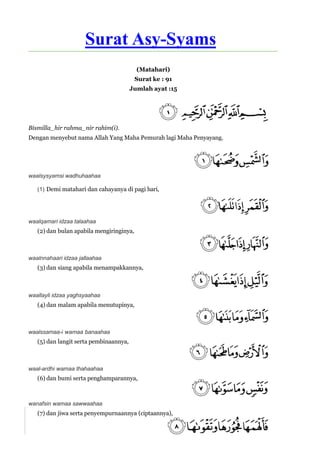The verses of Surat At-Takatsur, specifically ayat 1-8, remind us of the fleeting nature of worldly life and the inevitable reality of the Hereafter. These verses urge us to reflect on our priorities and the distractions that consume our time. Understanding the meaning of these ayat, or “arti surat at takatsur ayat 1-8 beserta artinya,” can deepen our appreciation for the message conveyed.
As we delve into these verses, we will explore their significance and how they resonate in our daily lives, guiding us towards a more meaningful existence. Let’s embark on this journey of reflection together.
Arti Surat At Takatsur Ayat 1-8 Beserta Artinya
Surat At-Takatsur is the 102nd chapter of the Quran, consisting of a total of 8 verses. It deals with the themes of human distraction and the pursuit of worldly gain, highlighting the importance of focusing on the hereafter. Understanding the meaning behind each verse can provide deeper insights into the message conveyed by this surat. Let’s break down each verse from 1 to 8 and explore its significance.
Verse 1: “Al-Hakumu At-Takathur” – The Rivalry in Worldly Increase
The first verse introduces the concept of “al-takathur,” which translates to the rivalry or competition in increasing wealth and possessions. This verse serves as a wake-up call for people, drawing attention to how individuals often get caught up in accumulating more material goods.
– **Meaning**: The verse warns against the distractions that come from wanting more.
– **Significance**: It reminds believers that life can easily become engulfed in the chase for material wealth, making them forget what truly matters.
Verse 2: “Hatta Zurtumul Maqabir” – Until You Visit the Graves
In this verse, the phrase “until you visit the graves” suggests that people often neglect the reality of death while they are busy seeking more wealth.
– **Meaning**: It emphasizes that accumulation of wealth is temporary and can lead to neglect of important spiritual obligations.
– **Significance**: This serves to remind believers that they should reflect on life and mortality, as it brings clarity to what holds true value.
Verse 3: “Kalla Sawfa Ta’lamun” – But No! You Will Surely Know
This verse aggressively refutes the previous notion of relentless competition for wealth. It provides a clear warning that individuals will eventually understand the futility of their pursuits.
– **Meaning**: The “kalla” signifies a strong denial, indicating that a rude awakening awaits those who deny the consequences of their actions.
– **Significance**: It nudges believers to consider the realization of truth that awaits in the afterlife, emphasizing accountability.
Verse 4: “Thumma Kalla Sawfa Ta’lamun” – Again, But No! You Will Surely Know
The repetition of the phrase reinforces the seriousness of the message.
– **Meaning**: This serves to underline that ignorance of spiritual truths will end, and everyone will face the reality of their actions.
– **Significance**: The repeated warning seeks to instill urgency in believers regarding their spiritual lives.
Verse 5: “Alam Naj’al Lahum ‘Aynayn?” – Did We Not Make for Them Two Eyes?
In the fifth verse, Allah questions the listeners about their senses. The reference to the eyes signifies the ability to see and perceive the truth.
– **Meaning**: This rhetorical question encourages believers to observe their surroundings and reflect on their priorities.
– **Significance**: It calls for an awakening of awareness in people about the transient nature of life and their actions.
Verse 6: “Walsanan Wa Shafatayn?” – And a Tongue and Two Lips?
Continuing from the previous verse, this one extends the question about the senses, including the tongue and lips.
– **Meaning**: These faculties are crucial for communication and expression, suggesting that people have the tools to seek and spread knowledge.
– **Significance**: This prompts believers to use their abilities wisely, promoting a life focused on beneficial deeds and meaningful conversations.
Verse 7: “Wahadaynahu Al-Najdayn” – And We Have Guided Him to the Two Paths
This verse highlights that everyone has been shown the right and wrong paths, emphasizing personal responsibility.
– **Meaning**: “Hadaynahu” indicates that guidance is provided, yet it’s up to individuals to choose their path.
– **Significance**: This reinforces the concept of free will in Islam and encourages believers to make conscious choices that align with righteousness.
Verse 8: “Fa La Ta’lamu Nafsun Ma Ukhfiya Lahum Min Qurrati A’yunin” – So No Soul Knows What Has Been Hidden for Them of Comforts of the Eyes
The last verse speaks about the rewards in the afterlife that await those who live righteously.
– **Meaning**: The phrase “ma ukhfiya” suggests that the rewards are beyond what anyone can imagine or comprehend.
– **Significance**: It serves as a powerful motivation for believers to strive for righteousness, reminding them that the best rewards come from faith and good deeds.
Thematic Exploration: Worldly Pursuits vs. Spiritual Awareness
The overarching theme of Surat At-Takatsur revolves around the conflict between worldly gains and spiritual acknowledgment. Here’s how these themes are woven throughout the verses:
- Distraction by Materialism: The opening verses highlight how easily people get diverted by the desire to accumulate wealth and belongings.
- Mortality Reminder: The mention of graves serves as a sobering reminder that life is finite and should be lived with purpose.
- Consequence of Actions: The repeated warnings about future knowledge reinforce that every action has consequences, and one cannot escape divine judgment.
- Sensory Awareness: The references to the senses promote reflection and observation, urging believers to be mindful of their environment and priorities.
- Guidance and Responsibility: The verses emphasize that while guidance is provided, human beings must actively choose their paths.
- Promise of Reward: The last verse serves as a comforting reminder of the unseen blessings waiting for those who live a life in accordance with their faith.
Applying the Lessons of Surat At-Takatsur in Daily Life
The teachings of Surat At-Takatsur can be applied in various aspects of our daily lives to enhance our spiritual growth and personal development. Here are some practical applications:
Reflecting on Priorities
– Take time to evaluate what truly matters in your life.
– Write down your top priorities and compare them with how you spend your time.
– Consider making adjustments to align your daily activities with your core values.
Embracing Gratitude
– Practice gratitude by acknowledging the blessings you already possess.
– Maintain a gratitude journal where you list things you are thankful for.
– This habit helps reduce the craving for more and focus on the present.
Examining Goals
– Regularly review your personal and professional goals.
– Assess whether these goals align with your spiritual beliefs and values.
– Modify your goals to ensure they encompass a balance between worldly achievements and spiritual enrichment.
Engaging in Community Service
– Volunteer your time to help those in need.
– Engaging in community service can provide perspective on the importance of compassion and generosity.
– Such acts can also strengthen your sense of community and connection to others.
Incorporating Spiritual Reflections
– Dedicate time daily for reflection and prayer.
– Use this time to connect with your spirituality and evaluate your actions.
– Spiritual reflection can lead to greater awareness of your choices and their implications.
The verses of Surat At-Takatsur remind us of the delicate balance between worldly pursuits and spiritual awareness. By understanding and applying the teachings of this surat, we can enrich our lives, focus on what truly matters, and prepare ourselves for the hereafter. Let’s embrace these lessons and make every effort to prioritize our spiritual growth while navigating our daily lives. In a world filled with distractions, we must strive to maintain our focus on the ultimate purpose of existence: to live righteously and seek the pleasures of Allah.
Surat At – Takasur Ayat 1 – 8 Dengan Tulisan Latin dan Artinya
Frequently Asked Questions
“`html
What themes are highlighted in Surah At-Takathur verses 1-8?
Surah At-Takathur emphasizes the themes of materialism and the distractions of worldly pursuits. The verses illustrate how people’s obsession with accumulating wealth, prestige, and numerous offspring leads them away from the remembrance of Allah and the inevitable reality of life after death. It serves as a reminder of the transient nature of worldly gains and the importance of focusing on spiritual matters.
How does Surah At-Takathur address the concept of accountability?
The verses of Surah At-Takathur convey a strong message about accountability in the Hereafter. They remind individuals that despite their preoccupation with worldly affairs, they will ultimately be questioned about their actions and lifestyle choices. The reminder of the Day of Judgment emphasizes the need to prioritize one’s faith and righteous deeds over materialistic gains.
What lessons can one learn from the interpretation of Surah At-Takathur?
The interpretation of Surah At-Takathur encourages individuals to reflect on their priorities in life. It teaches the importance of balance between worldly pursuits and spiritual obligations. The surah serves as a warning against losing sight of the afterlife due to an excessive focus on material wealth and status, urging believers to remain mindful of their eternal life and responsibilities towards God.
How can one apply the teachings of Surah At-Takathur in daily life?
To apply the teachings of Surah At-Takathur in daily life, individuals should strive for a balanced approach. They can set goals that align with both their material ambitions and spiritual growth. Regularly engaging in acts of worship, charity, and self-reflection can help maintain a strong spiritual connection, ensuring that the pursuit of worldly success does not overshadow their obligations to Allah and the community.
What is the significance of the repeated reminders in Surah At-Takathur?
The repeated reminders in Surah At-Takathur serve to reinforce the message of the fleeting nature of life and the consequences of neglecting spiritual duties. This repetition emphasizes the urgency for believers to stay aware and to not become complacent in their life choices. It acts as a call to action, urging individuals to reflect on their priorities and to engage in meaningful acts that lead to spiritual fulfillment.
“`
Final Thoughts
The verses of ‘arti surat at takatsur ayat 1-8 beserta artinya’ provide a profound reflection on human tendencies towards materialism and competition. They remind us how easily we become distracted by worldly gains, forgetting the ultimate purpose of life.
These verses urge individuals to contemplate the consequences of their actions and the temporary nature of worldly possessions. By understanding their meanings, we can shift our focus towards more meaningful pursuits that contribute to our spiritual growth.
Ultimately, the message of ‘arti surat at takatsur ayat 1-8 beserta artinya’ encourages us to seek deeper connections and values beyond superficial pleasures.






